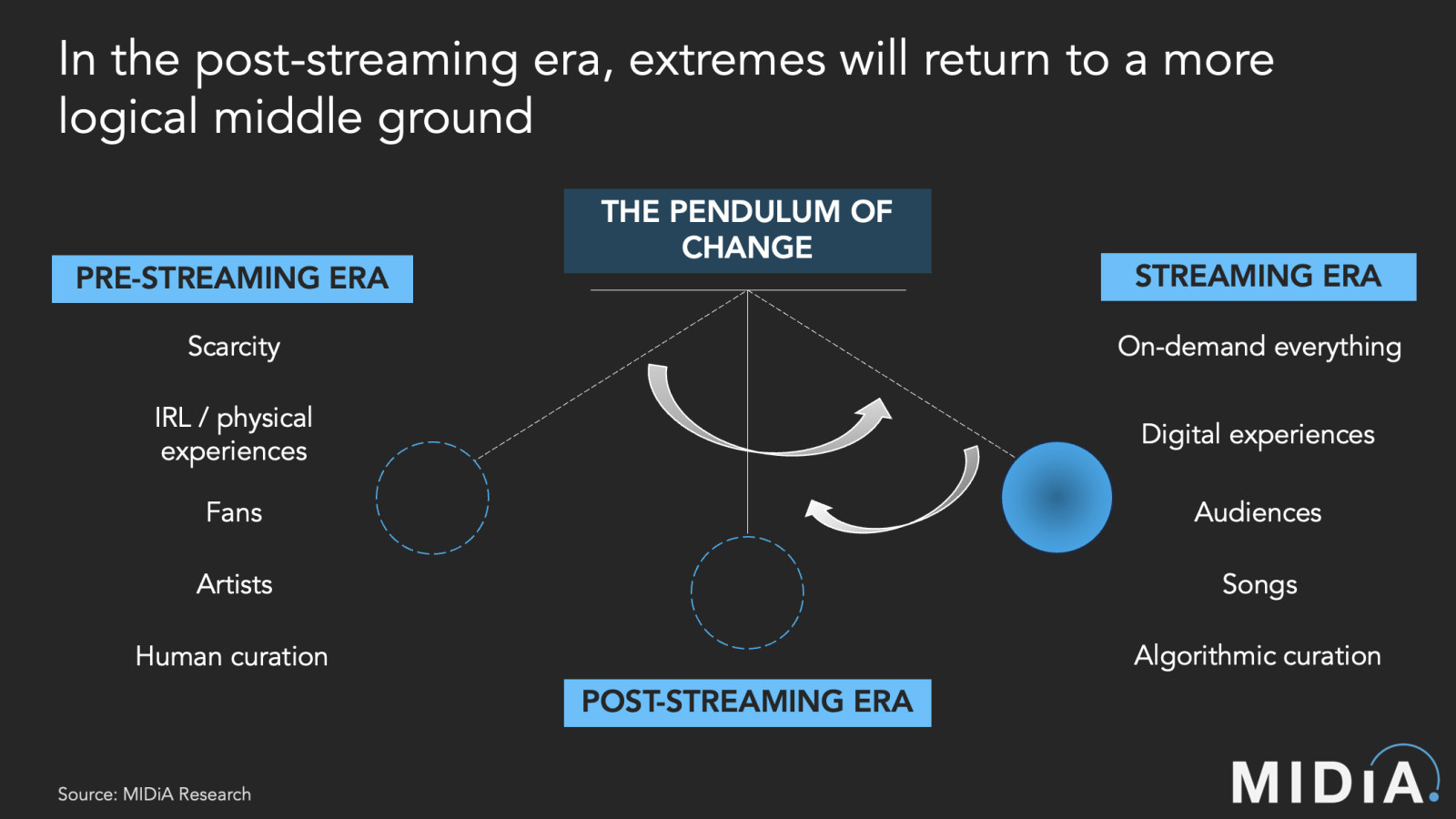The cultural pendulum swing is coming back around

Photo: MIDiA Research

Across culture, there is an eerie sense of things coming full circle. After spending the past decade building an industry around ad-free streaming TV, Netflix has ads and feels increasingly like cable. Now that Spindrift and Simply have launched spiked seltzer, White Claw is making — you guessed it — regular seltzer. Big, high-waisted pants are on their way out, low-rise jeans are on their way in. In every industry, the cultural pendulum has swung from one extreme to another and back again. No wonder we feel so dizzy.
But this yo-yo-ing is actually a well-studied — and expected — phenomenon. From media to political science, a pendulum analogy is often used to describe the tendency for cultural shifts to swing to extremes before eventually falling back towards a more logical middle ground. Put this way, streaming video’s current state — a hybrid of streaming and cable — makes a lot of sense. So does the state of the internet itself, which has evolved from decentralisation (Web 1.0) to centralisation (Web 2.0) and is now beginning to fragment again.
In music, the extreme pendulum swings from the pre-streaming to streaming era are well-documented:
Scarcity to on-demand everything: Vinyl records, CDs, and even mp3 downloads had varying degrees of scarcity. Records and CDs were produced in finite amounts. Sure, everyone with an internet connection could download an mp3, but not everyone could afford to build a library. Now, the on-demand streaming era has obliterated the concept of scarcity, ownership has been replaced by (very cheap) access, and it is getting harder for releases to stick out amid the estimated 120,000 tracks released every day.
IRL to digital: Music used to be something we experienced together, whether that meant going to a concert or huddling around a friend’s boombox to listen to a new CD. Not only that, but music ownership itself was physical. Gen Z is the first generation to grow up without any semblance of what it means to own physical music (or own it at all). Meanwhile, the music industry has latched onto one digital hype cycle after another, from NFTs to the metaverse.
Featured Report
Social 2025 Navigating platforms for fan power
The biggest apps are in the process of disruption. TikTok’s uncertain future and Meta’s apps relaxing content restrictions and fact checking will constitute greater challenges for creators, advertisers, and audiences looking to use and benefit from these platforms.
Find out more…
Fan-focused to audience-focused: While the pre-streaming era divided consumption between radio (for casual listeners) and retail (for fans), the streaming era buckets every listener into the same experience at the same price. Not only has this left fandom under-monetised, but streaming economics have all but destroyed the ability for artists to earn meaningful income without a mass audience, forcing everyone to focus relentlessly on scale.
Artists to songs: The music industry has always depended on hit songs. In the past, however, the hits still centred around artist “eras” and albums, which came with album art, lyric booklets, and other touchpoints that helped build an artist’s fandom. By decoupling tracks from albums and orienting the listening experience around playlists, music streaming inherently focuses on songs over artists, and the social video era has only deepened this shift.
Human curation to algorithmic curation: As recently as the late 2010s, human-curated playlists still served a tastemaking role. But in the 2020s, all platforms — and in turn, consumption — are at the mercy of the almighty algorithms.
A decade into these swings, however, we are seeing the pendulum begin its journey back towards a more logical middle ground. Having grown up without physical music ownership, it is no wonder that Gen Z are now seeking out what they’re missing — spurring an unexpected vinyl boom. Live, the only scarce music experience left, is bigger than ever. NFTs may have fizzled, but their core lesson of bringing scarcity to the digital space has led to a growing interest in new platforms and features that gate early or exclusive access to music. Labels and artists alike are shifting their priorities towards cultivating and monetising fandom.
The takeaway is not to hedge your bets on vinyl, IRL experiences, or — as much as labels would like to — superfans. When the pendulum swings to extremes, there is always something lost. In fact, the music industry is currently in danger of over-emphasizing superfans, a group that — while long-neglected — is just one part of the much larger picture. The majority of listeners will always be casual, and they are important to the industry, as are a wider spectrum of types of fans than the word “superfan” can encapsulate.
Spotify has allowed many more bands who never would have gotten past the local bar circuit pre-streaming to find their audiences, but that does not mean it cannot coexist with new ways to scarce-ify music, as UK band SAULT’s experiments attest. We can break the cycle of yo-yo-ing between extremes by recognising that when we find ourselves missing something about “the way it used to be”, whatever that means, it is not a reason to sprint to the opposite direction. It does mean that we have gone too far one way, but not that we should go all the way back. Perhaps the most groundbreaking, disruptive thing a music company can do is to find a path right down the middle.

There is a comment on this post, add your opinion.